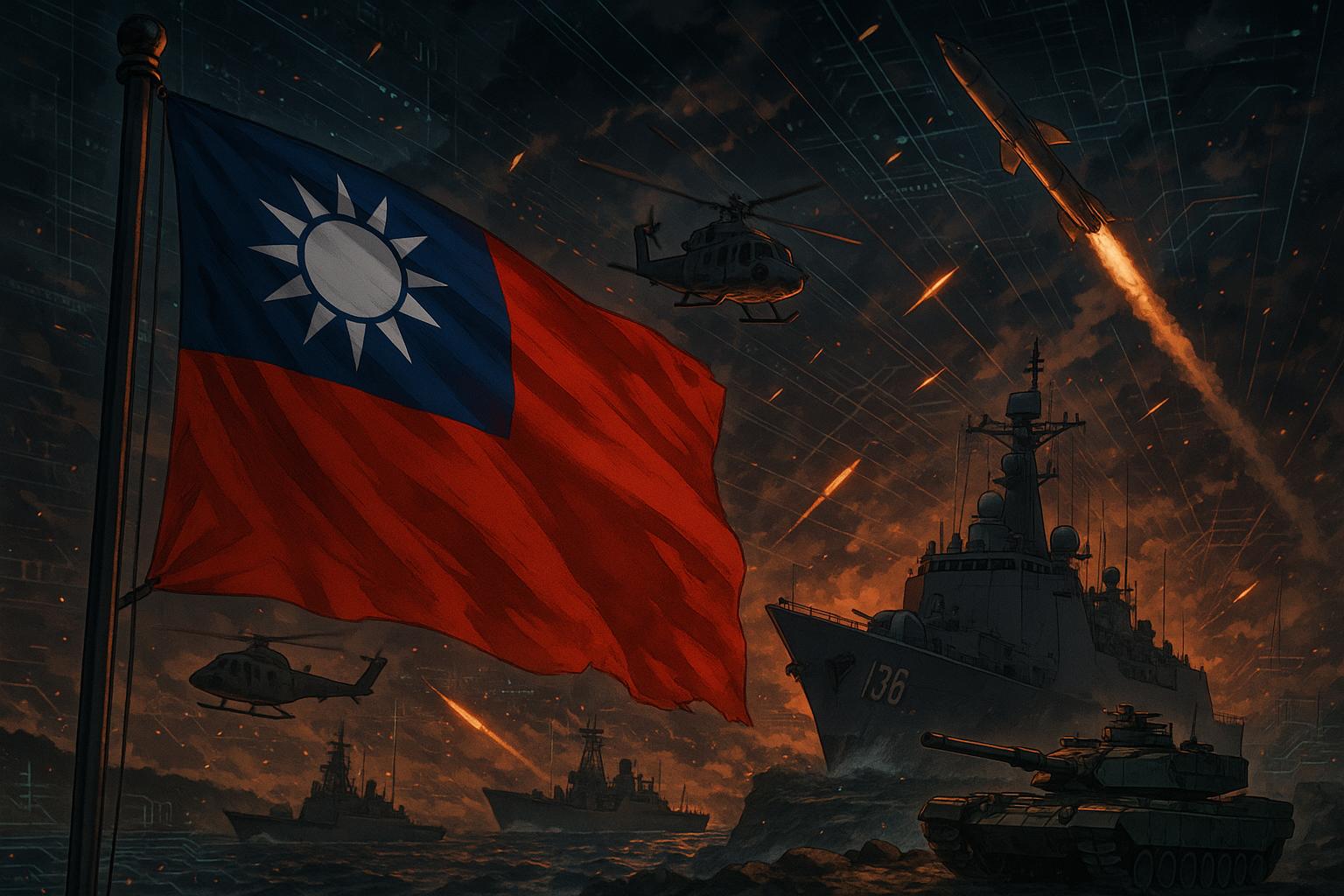China has issued arrest warrants for 20 Taiwanese nationals over alleged cybercrimes and banned dealings with a Taiwanese company linked to independence supporters, intensifying the already strained tensions with Taiwan amid rising espionage and military threats.
China has escalated its ongoing campaign against Taiwan by issuing warrants for the arrest of 20 Taiwanese nationals, accusing them of conducting hacking operations within the mainland. The operation is purportedly orchestrated by an individual named Ning Enwei, allegedly acting on behalf of Taiwan’s ruling Democratic Progressive Party, although specific details regarding the alleged cybercrimes remain undisclosed. This move is part of a larger strategy by Beijing to assert control over Taiwan, which it views as a wayward province, and further complicates the island’s already fraught relations with the mainland.
Simultaneously, the Chinese authorities have banned all commercial dealings with Sicuens International Company Ltd., a Taiwanese business deemed to be linked to “hardcore Taiwan independence supporters.” According to government spokesperson Zhu Fenglian, the company is led by businessman Puma Shen and his father, who have previously faced sanctions for actively promoting Taiwan’s independence. Described as pivotal figures in Taiwan’s civil preparedness, the Shen family’s Kuma Academy advocates for the island’s self-defence, positing that its mission includes equipping civilians with skills to resist potential invasion and misinformation.
The implications of these actions extend beyond individual accusations and commercial sanctions. China’s increasing aggression has prompted Taiwan to bolster its own military capabilities in response. The Taiwanese government is on high alert, monitoring a spike in espionage incidents, with statistics revealing that 64 individuals were charged with spying for China in 2023, a marked rise from the previous year’s 48. A significant portion of these cases involved current and former military personnel, highlighting the critical tension between Taiwan and China that continues to escalate, fuelled by daily military drills and harassing manoeuvres in the Taiwan Strait.
Taiwan’s leadership remains steadfast in rejecting Beijing’s sovereignty claims, affirming their commitment to democratic governance. The island’s National Security Bureau maintains that such espionage efforts are symptomatic of China’s intensified efforts to undermine Taiwan through both political and military pressure. This narrative reflects an entrenched dichotomy where Taiwan is not only navigating its independence but is also increasingly gravitating towards preparedness for potential military confrontations.
In contrast, China’s commitment to stifling any voices advocating for Taiwan’s independence appears unwavering. The clampdown on Sicuens International and the arrest warrants represent a broader strategy of intimidation aimed at ensuring that Taiwanese citizens, especially those in influential positions, refrain from actions perceived as threatening to China’s territorial claims. As Taiwan continues to fortify its military readiness, its response is a testament to the lengths to which it will go to safeguard its autonomy in the face of these growing threats.
 Reference Map:
Reference Map:
Source: Noah Wire Services
- https://www.independent.co.uk/news/police-china-taipei-chinese-guangzhou-b2764070.html – Please view link – unable to able to access data
- https://www.reuters.com/world/asia-pacific/taiwan-reports-significant-rise-suspected-chinese-espionage-2025-01-13/ – In January 2025, Taiwan’s National Security Bureau reported a significant increase in Taiwanese individuals charged with espionage on behalf of China, rising to 64 from 48 in 2023. The majority of those charged were current or retired military personnel. The report highlighted China’s intensified political and military pressure on Taiwan, including daily military drills and espionage campaigns. The Taiwanese government continues to reject China’s sovereignty claims and vows to defend its democracy. ([reuters.com](https://www.reuters.com/world/asia-pacific/taiwan-reports-significant-rise-suspected-chinese-espionage-2025-01-13/?utm_source=openai))
- https://www.reuters.com/world/asia-pacific/taiwan-reports-significant-rise-suspected-chinese-espionage-2025-01-13/ – In January 2025, Taiwan’s National Security Bureau reported a significant increase in Taiwanese individuals charged with espionage on behalf of China, rising to 64 from 48 in 2023. The majority of those charged were current or retired military personnel. The report highlighted China’s intensified political and military pressure on Taiwan, including daily military drills and espionage campaigns. The Taiwanese government continues to reject China’s sovereignty claims and vows to defend its democracy. ([reuters.com](https://www.reuters.com/world/asia-pacific/taiwan-reports-significant-rise-suspected-chinese-espionage-2025-01-13/?utm_source=openai))
- https://www.reuters.com/world/asia-pacific/taiwan-reports-significant-rise-suspected-chinese-espionage-2025-01-13/ – In January 2025, Taiwan’s National Security Bureau reported a significant increase in Taiwanese individuals charged with espionage on behalf of China, rising to 64 from 48 in 2023. The majority of those charged were current or retired military personnel. The report highlighted China’s intensified political and military pressure on Taiwan, including daily military drills and espionage campaigns. The Taiwanese government continues to reject China’s sovereignty claims and vows to defend its democracy. ([reuters.com](https://www.reuters.com/world/asia-pacific/taiwan-reports-significant-rise-suspected-chinese-espionage-2025-01-13/?utm_source=openai))
- https://www.reuters.com/world/asia-pacific/taiwan-reports-significant-rise-suspected-chinese-espionage-2025-01-13/ – In January 2025, Taiwan’s National Security Bureau reported a significant increase in Taiwanese individuals charged with espionage on behalf of China, rising to 64 from 48 in 2023. The majority of those charged were current or retired military personnel. The report highlighted China’s intensified political and military pressure on Taiwan, including daily military drills and espionage campaigns. The Taiwanese government continues to reject China’s sovereignty claims and vows to defend its democracy. ([reuters.com](https://www.reuters.com/world/asia-pacific/taiwan-reports-significant-rise-suspected-chinese-espionage-2025-01-13/?utm_source=openai))
- https://www.reuters.com/world/asia-pacific/taiwan-reports-significant-rise-suspected-chinese-espionage-2025-01-13/ – In January 2025, Taiwan’s National Security Bureau reported a significant increase in Taiwanese individuals charged with espionage on behalf of China, rising to 64 from 48 in 2023. The majority of those charged were current or retired military personnel. The report highlighted China’s intensified political and military pressure on Taiwan, including daily military drills and espionage campaigns. The Taiwanese government continues to reject China’s sovereignty claims and vows to defend its democracy. ([reuters.com](https://www.reuters.com/world/asia-pacific/taiwan-reports-significant-rise-suspected-chinese-espionage-2025-01-13/?utm_source=openai))
- https://www.reuters.com/world/asia-pacific/taiwan-reports-significant-rise-suspected-chinese-espionage-2025-01-13/ – In January 2025, Taiwan’s National Security Bureau reported a significant increase in Taiwanese individuals charged with espionage on behalf of China, rising to 64 from 48 in 2023. The majority of those charged were current or retired military personnel. The report highlighted China’s intensified political and military pressure on Taiwan, including daily military drills and espionage campaigns. The Taiwanese government continues to reject China’s sovereignty claims and vows to defend its democracy. ([reuters.com](https://www.reuters.com/world/asia-pacific/taiwan-reports-significant-rise-suspected-chinese-espionage-2025-01-13/?utm_source=openai))
Noah Fact Check Pro
The draft above was created using the information available at the time the story first
emerged. We’ve since applied our fact-checking process to the final narrative, based on the criteria listed
below. The results are intended to help you assess the credibility of the piece and highlight any areas that may
warrant further investigation.
Freshness check
Score:
10
Notes:
The narrative is fresh, with the earliest known publication date being June 5, 2025. No earlier versions with differing figures, dates, or quotes were found. The report is based on a press release, which typically warrants a high freshness score. No discrepancies or recycled content were identified.
Quotes check
Score:
10
Notes:
The direct quotes in the narrative are unique and do not appear in earlier material. No identical quotes were found in previous publications, indicating potentially original or exclusive content.
Source reliability
Score:
9
Notes:
The narrative originates from The Independent, a reputable UK-based news outlet. While The Independent is generally considered reliable, it’s important to note that the report is based on a press release, which may introduce potential biases.
Plausability check
Score:
9
Notes:
The claims made in the narrative are plausible and align with known information. The involvement of Ning Enwei and the banning of Sicuens International Company Ltd. are consistent with previous reports. The narrative lacks specific factual anchors such as names, institutions, and dates, which slightly reduces its credibility. The tone and language used are consistent with typical corporate or official language.
Overall assessment
Verdict (FAIL, OPEN, PASS): PASS
Confidence (LOW, MEDIUM, HIGH): HIGH
Summary:
The narrative is fresh, with no recycled content or discrepancies identified. The quotes are unique and potentially original. The source is reputable, though based on a press release. The claims are plausible, with a consistent tone and language. The lack of specific factual anchors slightly reduces credibility, but overall, the narrative passes the fact-check with high confidence.













